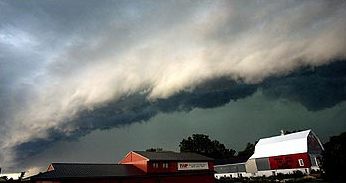|
I-94 Derecho
The I-94 derecho was a progressive derecho that moved through the Upper Mississippi Valley on July 19, 1983. It is so called because the derecho moved through Minnesota and Wisconsin with I-94 as its axis. The derecho formed as an area of disturbed weather in eastern Montana moved eastward. It moved into northwestern North Dakota at around 7a.m. CDT forming a small bow echo. Williston and Minot reported winds up to . Further development formed two and three bow echo segments as the storm moved into Minnesota. Winds of were recorded at the Alexandria airport. The winds damaged and destroyed hangars. It continued southeast and arrived at Minneapolis, Minnesota at around 4p.m. CDT and left 250,000 people without power. Trees were blown over and buildings damaged as the derecho raced through Wisconsin. A meteorologist working at the University of Wisconsin–Madison saw the derecho approach from the southeastern shore of Lake Mendota near Madison, Wisconsin. On the unive ... [...More Info...] [...Related Items...] OR: [Wikipedia] [Google] [Baidu] |
Derecho
A ''derecho'' (, from es, derecho, link=no , 'straight') is a widespread, long-lived, straight-line wind storm that is associated with a fast-moving group of severe thunderstorms known as a mesoscale convective system. Derechos can cause hurricanic and tornadic-force winds, heavy rains, and flash floods. In many cases, convection-induced winds take on a bow echo (backward "C") form of squall line, often forming beneath an area of diverging upper tropospheric winds, and in a region of both rich low-level moisture and warm-air advection. Derechos move rapidly in the direction of movement of their associated storms, similar to an outflow boundary (gust front), except that the wind remains sustained for a greater period of time (often increasing in strength after onset), and may exceed hurricane-force. A derecho-producing convective system may remain active for many hours and, occasionally, over multiple days. A warm-weather phenomenon, derechos occur mostly in summer, especial ... [...More Info...] [...Related Items...] OR: [Wikipedia] [Google] [Baidu] |
Lake Mendota
Lake Mendota is a freshwater eutrophic lake that is the northernmost and largest of the four lakes in Madison, Wisconsin. The lake borders Madison on the north, east, and south, Middleton on the west, Shorewood Hills on the southwest, Maple Bluff on the northeast, and Westport on the northwest. Lake Mendota acquired its present name in 1849 following a proposal by a surveyor named Frank Hudson, who claimed to be familiar with local Native American languages; Lyman C. Draper, the first corresponding secretary of the Wisconsin Historical Society, proposed that 'Mendota' could have been a Chippewa word meaning 'large' or 'great.' Early history Lake Mendota originated after the Wisconsin glaciation, which occurred approximately 15,000 years ago. Glacial ice, which had covered the Madison lakes (Lakes Mendota, Monona, Kegonsa, and Waubesa) at a thickness of over 300 meters, began to retreat northwest about 14,000 years ago, damming a glacial lake near the City of Middleton tha ... [...More Info...] [...Related Items...] OR: [Wikipedia] [Google] [Baidu] |
Natural Disasters In Minnesota
Nature, in the broadest sense, is the physical world or universe. "Nature" can refer to the phenomena of the physical world, and also to life in general. The study of nature is a large, if not the only, part of science. Although humans are part of nature, human activity is often understood as a separate category from other natural phenomena. The word ''nature'' is borrowed from the Old French ''nature'' and is derived from the Latin word ''natura'', or "essential qualities, innate disposition", and in ancient times, literally meant "birth". In ancient philosophy, ''natura'' is mostly used as the Latin translation of the Greek word ''physis'' (φύσις), which originally related to the intrinsic characteristics of plants, animals, and other features of the world to develop of their own accord. The concept of nature as a whole, the physical universe, is one of several expansions of the original notion; it began with certain core applications of the word φύσις by pre-Socr ... [...More Info...] [...Related Items...] OR: [Wikipedia] [Google] [Baidu] |
Natural Disasters In Illinois
Nature, in the broadest sense, is the physical world or universe. "Nature" can refer to the phenomena of the physical world, and also to life in general. The study of nature is a large, if not the only, part of science. Although humans are part of nature, human activity is often understood as a separate category from other natural phenomena. The word ''nature'' is borrowed from the Old French ''nature'' and is derived from the Latin word ''natura'', or "essential qualities, innate disposition", and in ancient times, literally meant " birth". In ancient philosophy, ''natura'' is mostly used as the Latin translation of the Greek word '' physis'' (φύσις), which originally related to the intrinsic characteristics of plants, animals, and other features of the world to develop of their own accord. The concept of nature as a whole, the physical universe, is one of several expansions of the original notion; it began with certain core applications of the word φύσις by pre-So ... [...More Info...] [...Related Items...] OR: [Wikipedia] [Google] [Baidu] |

.jpg)